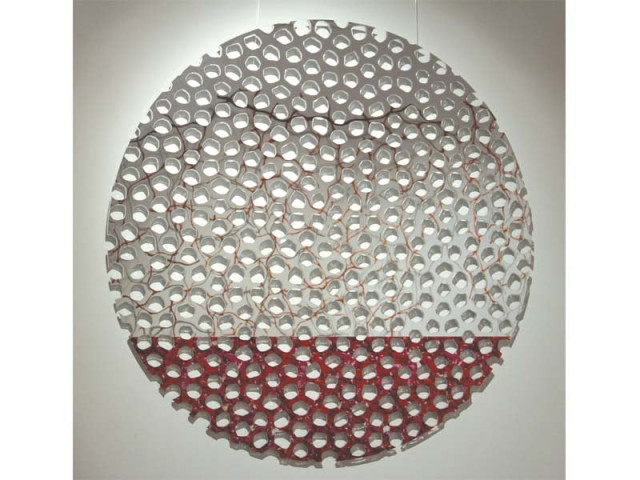Solo show: Connection, separation and (varying) points of view
Artist says she enjoys exploring constructivism.

A piece on display at Rohtas II Gallery by Nazia Ejaz . PHOTO: EXPRESS
Hayee made the remarks while talking about the artist’s first solo show underway in the city. “It’s a welcome change to see her return and witness how her style has evolved over time,” he said. Hayee said the evolution of her style had left Ejaz baffled too. He said the exhibit had surprised the audience as well which had been able to see a different body of work. “Jali-1, her first installation, is extremely interesting.
The way it has been fashioned from eucalyptus branches and red cotton thread is fascinating,” Hayee said.
He said Ejaz had told him that eucalyptus trees, indigenous to Australia, represented a colonial legacy as they were also conspicuous across South Asia. Affixing mauli to trees, Hayee said, depicted an affinity for Sufism. “How simple ideas can be transformed into something personal is intriguing. The way layers are constructed and how shadows fall makes one realise that each person is multifaceted, something one might not even be aware of,” he said.

Ejaz said she had been away from “home” for over a decade. She said this had made her profoundly aware of the construction of the “other.” Ejaz said that she enjoyed exploring this in her work. “I used the concept and physicality of screens as metaphors for points of separation within space,” she said. Ejaz said jalis, a feature of Indo-Islamic architecture, were used to separate and demarcate space, to establish boundaries and to shroud and reveal, depending on the perspective of the viewer. She said the interconnected and symmetrical structure of a screen created awareness regarding a space beyond the gaze and obstructed it at the same time.
“I work with a conceptual idea of connection, separation and varying points of view. If we just change our perspective, perhaps the “other” would not remain the “other” anymore,” Ejaz said. She said how one treated the “other” defined who they were. Ejaz said another parallel narrative in her work was premised on her personal interaction with the global art discourse. “I really enjoy playing with different mediums. I don’t like to be circumscribed. I have never liked labels. I enjoy crossing boundaries and thresholds,” she said.
Ejaz, who now lives in Adelaide, said she was inspired by her heritage and daily cross cultural life experiences. The artist graduated from the NCA in 1993 before obtaining an MA in visual art from University College of London’s Slade School of Art. She also holds a diploma in Indian art history from London’s School of Oriental and African Studies (SOAS) and Sotheby’s Institute. The exhibition will conclude on December 12.
Published in The Express Tribune, December 9th, 2015.



















COMMENTS
Comments are moderated and generally will be posted if they are on-topic and not abusive.
For more information, please see our Comments FAQ